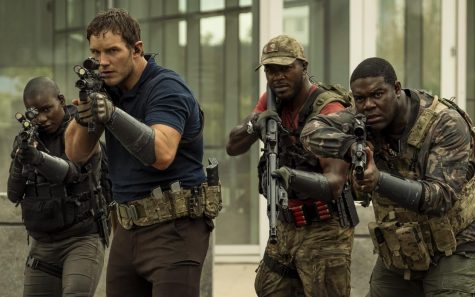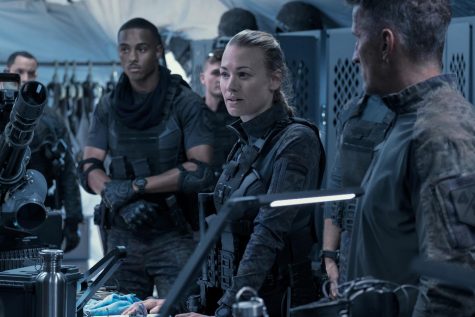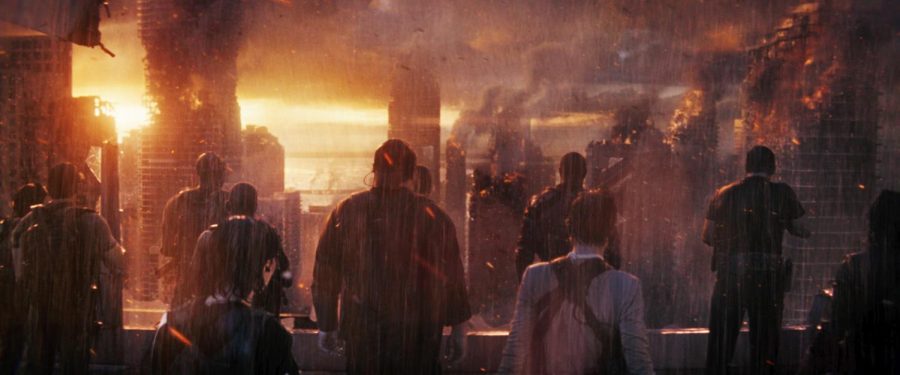‘The Tomorrow War’: Can Chris Pratt save us from the White Spikes?
Director Chris McKay and the cast explain how the fantastic special effects brought to life the ‘horrifying, ancient, and hungry’ aliens of 2051
https://hieshowcase.com/staff_name/courtesy-of-amazon-prime-video/
The world of 2051 is under attack by aliens in “The Tomorrow War.”
September 2, 2021
Now I’m not a sci-fi person, but I simply can’t get the plot of “The Tomorrow War” out of my head.
The charm of Dan Forester (Chris Pratt) and the intriguingly complex family situation involving his father James (J.K. Simmons), wife Emmy (Betty Gilpin), and daughter Muri (Ryan Kiera Armstrong and Yvonne Strahovski) will progressively invest you in their lives. You’ll find yourself relating many key issues in the movie to your own life while entrenched in the captivating battle of the White Spikes.
The film quickly jumps into the plot with people from the future descending into 2021 to announce an active war in 2051 between humans and aliens called White Spikes. The soldiers from the future are desperate for reinforcements, resulting in a draft of people from 2021. At some point, most present-day people will be required to time-travel, train, and serve in the war.
Dan ventures off to fight in the future, meeting Charlie (Sam Richardson), a first-time server who uses jokes to cope with his fear of the war. Dorian (Edwin Hodge) frightens both of them with his gruff demeanor as an experienced, serious soldier. Once in the future, Dan finds himself constantly running from White Spikes while strategizing with his daughter on how to defeat the creatures. Along the way, Dan has to decide if fixing his relationship with his father is worth his pride.

Throughout the film, “The Tomorrow War” subtly covers various serious topics through two hours of rapid surface-level plot. I caught myself drawing parallels from the current state of our planet’s environment and climate to the futuristic, yet damaging, threat of the White Spikes in 2051.
The sense of urgency and helplessness displayed through the characters sends a message to stop and think about what you and your family’s futures are on track to look like. This topic was mentioned in a recent press conference with Pratt, director Chris McKay, and the cast, which discussed what one generation owes to the next and the importance of taking care of our planet.
Not only does Pratt star in “The Tomorrow War,” but he also contributed as a director. McKay has experience as a director and in special effects as he recently directed the “Lego Batman” movies. Though having experience as an actor, Pratt said he is “grateful to learn” from McKay. McKay was, according to the cast, “open to collaboration, but had a very clear vision.”
Throughout the pandemic, Pratt stated the film “gave [him] a sense of hope” and “people need something like this.” I agree that most people will be able to appreciate some aspect of this movie as there is so much to explore beneath the storyline.
From an animation and special effects standpoint, the movie is fantastic. I was shocked to learn that the movie was primarily shot through imaginary props, meaning instead of having a physical White Spike in front of them, actors had to pretend as if they were under attack when really, they were just battling the air in front of them. McKay said his goal was to have the White Spikes be “horrifying, ancient, and hungry” creatures. I’d say he reached that image when yellow blood oozed from the corpse of a White Spike. At times it felt as if the White Spikes were going to jump through the screen and gobble me up.
Some scenes were still filmed with physical objects, though. Strahovski revealed her most daring act during filming was walking across a metal beam on only her first or second day on the set. Although she was attached to strings so she wouldn’t fall, she felt the walk was scary, yet didn’t say anything until after the scene was shot because she didn’t want to make a poor impression.

Jasmine Mathews, who played Lieutenant Hart, commented that her most daring scene was the introduction to the people of the present. As Hart delivers the message about the war in 2051, she holds a gun to enhance the severity of the information. During the press conference, Mathews said she was afraid of holding such a weapon, which is when Pratt chimed in, recalling telling Mathews, “Relax. You’re not coming to kill these people.”
To that end, “The Tomorrow War” doesn’t shy from the intense and real effects of serving in the military. Whether through a passing comment that someone’s relative never returned home after departing for service or creating a character who constantly jokes as a coping mechanism to combat the fear that active duty provokes, the movie touches upon a variety of aspects of being in a military family and serving.
When dissecting Dorian’s character, the cast explained that Dorian was the soldier who shows minimal emotion. In contrast, Charlie is used, in part, for comic relief, demonstrating the use of humor as a coping mechanism.
I was quite underwhelmed by the use of specific details, especially during the start of the movie. For instance, when Dan had to sign using his “biosignature” implied the science aspect would be more relevant. Although scientific technology does circle back, I felt that component lacked depth. Additionally, the details of tours, procedures of killing the White Spikes, and other specifics were highlighted, but lost in the initial viewing of the movie. In particular, information regarding military bases or time travel would have fit better in a television series as opposed to a movie.
Comparably, Dan’s former careers — serving in Iraq and being a high school science teacher — were touched upon here and there, but I felt like both occupations could have been more prominent in the movie. Though I understand the crunch for time in this film, I would have liked to have learned more about the relationship between Dan and his father. In my opinion, the film would be better off as a TV series as there are just too many inventive ideas to unpack here.
That being said, the family dynamics in this film will tug at your heart. The 2021 Dan is stuck in an impossible position to try to fix the future without having lived the past. Inevitably, Dan realizes he must figure out what is best for Muri, whether that be in 2051 or back in 2021.
My favorite scene of the movie is the moment between Dan and 2051 Muri on the beach shortly after they meet as father and daughter, where emotions are high and an honest conversation changes their perspectives about one another.
Overall, I enjoyed “The Tomorrow War.” It caused me to think critically about our planet, as well as force me to diligently follow the plot — although my greatest gripe with the film was just that: the detailed plot. However, if you are a science-fiction or Chris Pratt fanatic, I highly recommend watching “The Tomorrow War.” It will most definitely keep you engaged.
(“The Tomorrow War” premieres July 2 on Amazon Prime Video.)
–Originally published July 1, 2021 for Headliners in Education–








